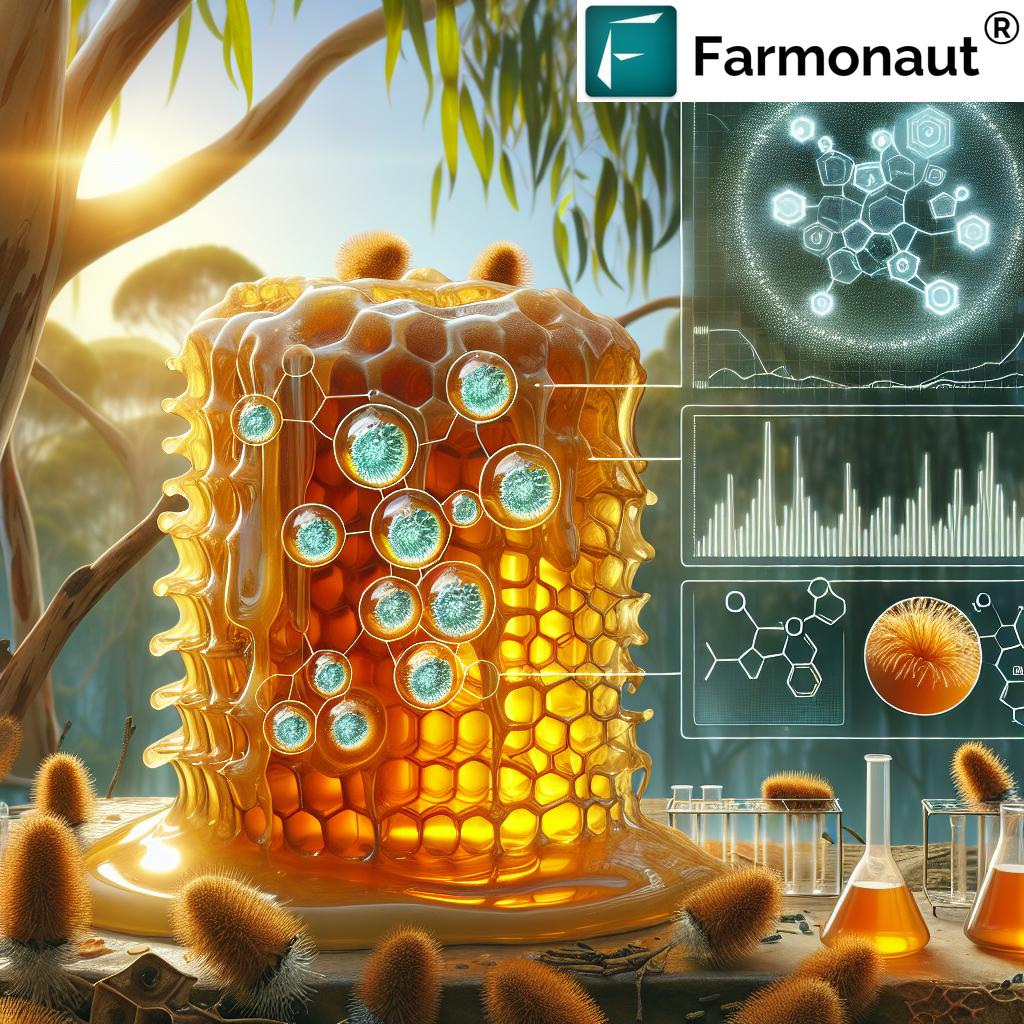Maximizing Agricultural Investment Returns: Diversified Portfolio Strategies for Australian Farmers with Farmonaut
“Australian farmers using diversified portfolio strategies can potentially increase their agricultural investment returns by up to 30%, according to recent studies.”
In today’s dynamic agricultural landscape, Australian farmers face unprecedented challenges and opportunities. At Farmonaut, we understand the critical importance of maximizing agricultural investment returns while embracing sustainable farming practices. This comprehensive guide explores cutting-edge agricultural investment strategies and how our innovative satellite-based farm management solutions can help Australian farmers build resilient, diversified portfolios for long-term success.
The Power of Diversification in Agricultural Investments
Diversification is a cornerstone of sound investment strategy, and agriculture is no exception. By spreading investments across various agricultural assets, Australian farmers can mitigate risks and potentially increase returns. Let’s explore some key diversification strategies:
- Crop Diversification: Planting a variety of crops can help protect against market fluctuations and environmental risks.
- Livestock Integration: Combining crop and livestock operations can create synergies and additional income streams.
- Agricultural Real Estate Investment Trusts (REITs): These offer exposure to agricultural land and infrastructure without direct farm management.
- Water Rights Investments: In Australia’s often drought-prone climate, water rights can be a valuable asset.
At Farmonaut, our satellite-based crop health monitoring system provides real-time insights to support these diversification strategies. By leveraging our technology, farmers can make data-driven decisions about crop rotation, resource allocation, and farm management practices.

Climate-Resilient Agriculture: A Key to Sustainable Returns
“Implementing climate-resilient agriculture techniques can lead to a 25% reduction in water usage while maintaining crop yields in Australian farms.”
As climate change continues to impact agricultural productivity, adopting climate-resilient practices is crucial for long-term success. Our Jeevn AI Advisory System provides personalized recommendations to help farmers adapt to changing environmental conditions. Here are some strategies we support:
- Drought-Resistant Crop Varieties: Selecting crops that can withstand water stress.
- Precision Irrigation: Using our satellite data to optimize water usage and reduce waste.
- Soil Health Management: Implementing practices that improve soil structure and water retention.
- Weather Risk Management: Utilizing our advanced weather forecasting to make timely decisions.
By incorporating these climate-resilient strategies, Australian farmers can protect their investments and ensure sustainable returns even in the face of environmental challenges.
Optimizing Farm Income through Innovative Lease Agreements
Lease agreements play a crucial role in agricultural asset management and can significantly impact farm income. At Farmonaut, we provide data-driven insights to help farmers and landowners negotiate mutually beneficial lease terms. Consider these innovative leasing strategies:
- Flex Leases: Adjusting rent based on crop yields or commodity prices.
- Share Leases: Sharing both risks and rewards between landowners and tenants.
- Long-Term Leases with Improvement Clauses: Encouraging sustainable land management practices.
Our blockchain-based traceability solution can help verify compliance with lease terms and track improvements made to the land, ensuring transparency and trust between all parties involved.
Agricultural Water Management: A Critical Component of Rural Development
Effective water management is essential for sustainable agriculture, particularly in Australia’s often water-scarce regions. Farmonaut’s satellite-based monitoring system provides valuable insights into soil moisture levels and crop water requirements, enabling farmers to optimize their water usage. Here are some strategies we support:
- Precision Irrigation: Using our real-time data to apply water only where and when it’s needed.
- Water-Efficient Crop Selection: Choosing crops that are well-suited to local water availability.
- Rainwater Harvesting: Implementing systems to capture and store rainwater for use during dry periods.
- Wastewater Recycling: Exploring opportunities to reuse treated wastewater for irrigation.
By implementing these water management strategies, Australian farmers can not only reduce costs but also contribute to the sustainable development of rural communities.

Unlocking the Potential of Agricultural REITs
Agricultural Real Estate Investment Trusts (REITs) offer a unique opportunity for investors to gain exposure to the agricultural sector without direct farm management responsibilities. These investment vehicles can provide both income generation through rent collection and capital growth through land appreciation. Here’s how Farmonaut’s technology can support agricultural REIT investors:
- Asset Valuation: Our satellite imagery and AI-powered analytics can provide accurate, up-to-date information on land quality and productivity.
- Performance Monitoring: Track the health and yield of crops across large portfolios of agricultural land.
- Risk Assessment: Identify potential environmental risks and assess the impact of climate change on agricultural assets.
By leveraging our advanced technology, agricultural REIT managers can make more informed investment decisions and optimize their portfolio performance.
Commodity Forecasts and Strategic Planning
Accurate commodity forecasts are essential for strategic planning and maximizing returns in agriculture. Farmonaut’s satellite-based crop monitoring and AI-driven analytics provide valuable insights into potential yields and market trends. Here’s how our technology supports commodity forecasting:
- Crop Health Assessment: Real-time monitoring of crop health across large areas to predict potential yields.
- Weather Impact Analysis: Assessing the impact of weather patterns on crop production and quality.
- Market Trend Integration: Combining our crop data with market analytics to provide comprehensive forecasts.
By utilizing these forecasts, Australian farmers and agribusinesses can make informed decisions about planting, harvesting, and marketing their crops, ultimately maximizing their returns.
Infrastructure Improvements for Long-Term Growth
Investing in agricultural infrastructure is crucial for long-term productivity and growth. Farmonaut’s technology can help identify areas where infrastructure improvements can have the most significant impact. Consider these key areas for investment:
- Irrigation Systems: Upgrading to more efficient irrigation technologies to conserve water and improve crop yields.
- Storage Facilities: Investing in modern storage solutions to reduce post-harvest losses and improve market timing.
- Farm Roads: Improving access to fields and transportation routes to enhance operational efficiency.
- Technology Infrastructure: Implementing high-speed internet and IoT devices to support precision agriculture practices.
Our fleet and resource management tools can help optimize the use of agricultural machinery and equipment, ensuring that infrastructure investments are utilized to their full potential.
The Role of Indexation and Valuation in Revenue Growth
Accurate indexation and valuation of agricultural assets are critical for long-term revenue growth and investment planning. Farmonaut’s satellite-based monitoring and AI analytics provide valuable data for these processes:
- Land Valuation: Our technology offers up-to-date information on land productivity and quality, supporting accurate valuations.
- Crop Yield Indexing: Track and compare crop yields over time to identify trends and improvement opportunities.
- Asset Performance Metrics: Develop comprehensive performance indicators for agricultural assets based on real-time data.
By leveraging these tools, Australian farmers and investors can make data-driven decisions about asset allocation, lease agreements, and investment strategies.
Diversified Agricultural Portfolio Strategies Comparison
| Strategy | Estimated Annual Return (%) | Risk Level | Climate Resilience Score (1-10) | Key Benefits |
|---|---|---|---|---|
| Traditional Crop Farming | 5-8% | Medium | 5 | Established markets, familiar practices |
| Crop Diversification | 7-12% | Low-Medium | 7 | Risk mitigation, market flexibility |
| Agricultural REITs | 8-15% | Low | 6 | Passive income, professional management |
| Water Rights Investments | 10-20% | Medium-High | 9 | Scarcity value, essential resource |
| Sustainable Farming Practices | 6-10% | Low-Medium | 8 | Long-term soil health, premium markets |
This table provides a comparative overview of different agricultural investment strategies, highlighting their potential returns, risk levels, and climate resilience. By diversifying across these strategies, Australian farmers can build a robust portfolio that balances risk and reward while adapting to changing environmental conditions.
Farmonaut’s Role in Maximizing Agricultural Investment Returns
At Farmonaut, we’re committed to empowering Australian farmers with the tools and insights they need to maximize their agricultural investment returns. Our comprehensive suite of services includes:
- Satellite-Based Crop Health Monitoring: Real-time insights into crop health and productivity.
- Jeevn AI Advisory System: Personalized recommendations for optimal farm management.
- Blockchain-Based Product Traceability: Ensuring transparency and trust in agricultural supply chains.
- Fleet and Resource Management: Optimizing the use of agricultural machinery and resources.
- Carbon Footprinting: Helping agribusinesses monitor and reduce their environmental impact.
By leveraging our advanced technology and data-driven insights, Australian farmers can make informed decisions about crop selection, resource allocation, and investment strategies, ultimately maximizing their returns in a sustainable manner.
Conclusion: Building a Resilient Agricultural Portfolio for Sustainable Growth
In today’s dynamic agricultural market, building a resilient and diversified portfolio is key to long-term success. By combining traditional farming practices with innovative technologies and investment strategies, Australian farmers can maximize their returns while adapting to changing environmental and market conditions.
Farmonaut’s suite of satellite-based farm management solutions provides the data-driven insights needed to make informed decisions about crop selection, resource allocation, and investment strategies. From real-time crop health monitoring to AI-powered advisory services, our tools empower farmers to optimize their operations and build sustainable, profitable agricultural businesses.
As we look to the future of Australian agriculture, the integration of technology, sustainable practices, and diversified investment strategies will be crucial. By embracing these approaches and leveraging the power of Farmonaut’s innovative solutions, Australian farmers can position themselves for success in an ever-evolving agricultural landscape.
FAQs
- How can Farmonaut help me diversify my agricultural portfolio?
Farmonaut provides real-time satellite data and AI-driven insights to help you make informed decisions about crop selection, resource allocation, and farm management practices, supporting a diversified approach to agriculture. - What is the role of agricultural REITs in a diversified portfolio?
Agricultural REITs offer exposure to agricultural land and infrastructure without direct farm management, providing potential income through rent and capital growth through land appreciation. - How can I improve the climate resilience of my farm?
Farmonaut’s Jeevn AI Advisory System offers personalized recommendations for implementing climate-resilient practices, such as selecting drought-resistant crops and optimizing water usage. - What are the benefits of using satellite-based crop monitoring?
Satellite-based monitoring provides real-time insights into crop health, soil moisture levels, and other critical metrics, helping you make timely decisions about irrigation, fertilizer usage, and pest management. - How can blockchain technology benefit my agricultural business?
Farmonaut’s blockchain-based traceability solution ensures transparency in supply chains, verifies compliance with lease terms, and helps build trust with consumers and partners.
Ready to maximize your agricultural investment returns with Farmonaut’s innovative solutions? Explore our services today:
For developers interested in integrating our powerful satellite and weather data into their own systems, check out our API and API Developer Docs.




















